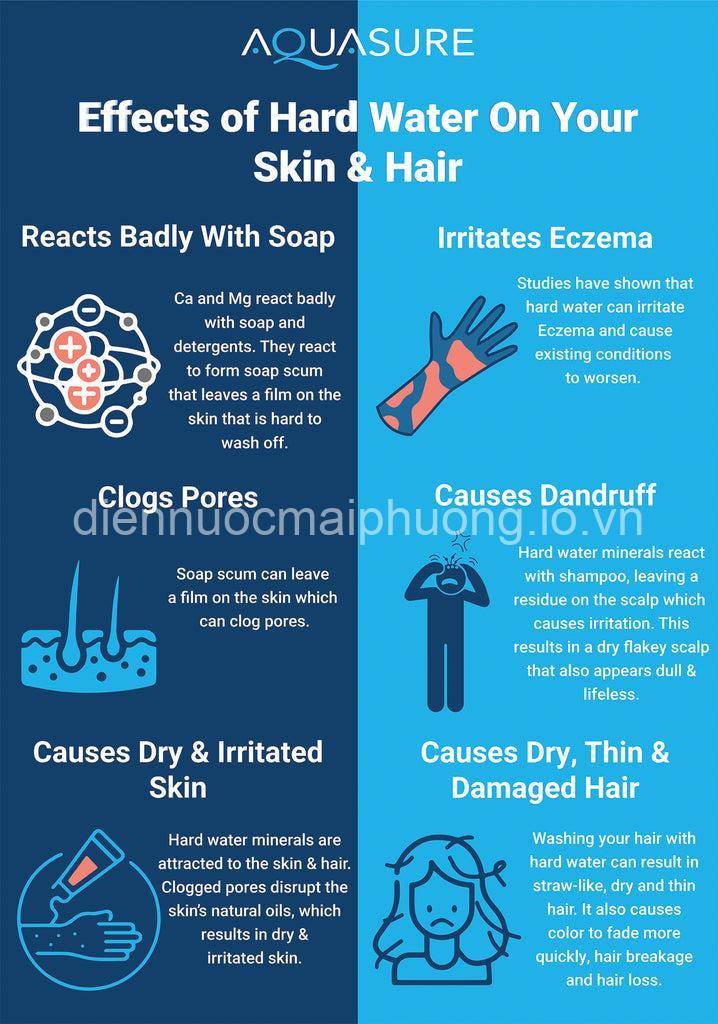Water knowledge
Water Hardness: What It Is & How It Affects You & Your Home
Water Hardness: What It Is & How It Affects You & Your Home. In today’s article, diennuocmaiphuong.io.vn will explore with you in the most detailed and complete way. See now!
What is Water Hardness and How Does It Affect You?
Water hardness refers to the amount of dissolved minerals, primarily calcium and magnesium, present in water. These minerals dissolve from rocks and soil as water flows through them. Water hardness is measured in parts per million (ppm) or grains per gallon (gpg).
The higher the mineral content, the harder the water. Water is classified into different levels of hardness:
- Soft Water: 0-60 ppm
- Moderately Hard Water: 61-120 ppm
- Hard Water: 121-180 ppm
- Very Hard Water: Over 180 ppm
Temporary hardness is caused by dissolved calcium and magnesium bicarbonates. This type of hardness can be removed by boiling the water.
Permanent hardness is caused by dissolved calcium and magnesium sulfates, chlorides, or nitrates. Boiling water does not remove permanent hardness.
Hard water can have significant impacts on your home and health.

The Impact of Hard Water on Your Home and Appliances
Hard water can cause a number of problems around your home, particularly for your appliances.
Scale Buildup: Hard water minerals precipitate out of solution as they heat up, forming a hard, white, chalky deposit called scale. This scale can build up inside kettles, washing machines, dishwashers, water heaters, and even plumbing pipes. The result is reduced appliance efficiency and increased energy consumption. Scale buildup can also lead to premature appliance failure.
Soap Scum and Cleaning Effectiveness: Hard water reacts with soap to form soap scum, which can leave a residue on your dishes, clothes, and even your skin. This can make it difficult to get a good clean and can also leave your clothes looking dull.
Understanding the Health Effects of Hard Water
While there are many benefits to using soft water, hard water can also pose some health risks.
Kidney Stones: Hard water may contribute to the formation of kidney stones, but the connection isn’t completely clear. Kidney stones are more common in people who already have a predisposition to them. If you are concerned about kidney stones, talk to your doctor.
Other Potential Health Issues: Some research suggests a possible link between hard water and cardiovascular disease, but this needs further investigation. Hard water can also contribute to dry skin and hair, as the minerals can strip away natural oils. The effect on nutrient absorption from food is another area of research.
Testing and Measuring Water Hardness
To know what you’re dealing with, it’s essential to test your water hardness.
- Titration: This involves a chemical test using EDTA solution. It’s a precise method but requires specialized equipment.
- Test Strips: These are easy to use and offer a quick reading, but they are less precise.
- Water Hardness Testing Kits: These kits are available online and at hardware stores and provide a convenient way to test your water.
Once you test your water, it’s important to understand the results.
- Soft water: 0-60 ppm
- Moderately hard water: 61-120 ppm
- Hard water: 121-180 ppm
- Very hard water: Over 180 ppm
Water Softening Methods for Hard Water
If your water is hard, there are several methods to soften it.
-
Traditional Methods
- Boiling: This works only for temporary hardness. Boiling water will remove dissolved bicarbonates, making the water softer.
- Lime softening: This method involves adding lime (calcium hydroxide) to the water. The lime reacts with the calcium and magnesium in the water, causing them to precipitate out as calcium carbonate.
- Ion exchange: This method uses a resin bed that exchanges sodium or potassium ions for calcium and magnesium ions, effectively removing the hardness minerals.
-
Modern Methods:
- Reverse Osmosis: This method uses a semipermeable membrane to filter out dissolved minerals, including those responsible for hardness.
- Water softeners: These systems use salt to regenerate the ion-exchange resin, removing hardness minerals from the water.
- Magnetic water treatment: This method uses magnets to claim to reduce hardness. However, scientific evidence supporting its effectiveness is limited.
Choosing the Right Water Softening Solution
When selecting a water softening method, consider the following:
- Severity of water hardness: The level of hardness will dictate the type of treatment needed.
- Budget: Water softening systems can vary in cost, from DIY options to professional installations.
- Individual needs: Consider your specific needs, such as whether you have sensitive skin or a family with a history of kidney stones.
Always consult a qualified professional for personalized advice. They can assess your water hardness, recommend the best solution, and ensure proper installation.
The Advantages and Disadvantages of Soft Water
Soft water offers many benefits, but there are also potential downsides to consider.
Benefits:
- Improved appliance longevity: Soft water reduces scale buildup, extending the lifespan of appliances.
- Enhanced cleaning efficiency: Soft water allows for better cleaning with less soap and detergent, leading to brighter clothes and cleaner dishes.
- Healthier skin and hair: Soft water is gentler on skin and hair, reducing dryness, itchiness, and hair loss.
- Reduced maintenance costs: Softening your water can reduce the need for repairs and replacements for appliances, saving you money in the long run.
Drawbacks:
- Increased sodium content: Sodium is used in the regeneration process for some water softeners, which may be a concern for people on a low-sodium diet.
- Environmental concerns: Disposing of salt brine from water softeners can raise environmental concerns.
- Cost: The initial installation and ongoing maintenance costs for water softeners can be significant.
Resources for Further Information
- EPA: [EPA Website Link]
- Water Quality Association: [WQA Website Link]
For more information on water hardness and testing, you can visit these websites. You can also find scientific research articles on water hardness and its effects. There are also online water hardness testing services available.
Conclusion
Understanding water hardness is crucial for maintaining your home, appliances, and overall well-being.
Whether you’re dealing with scale buildup, soap scum, or potential health concerns, knowing the hardness level of your water is the first step to taking action.
If you’re looking for more information on water hardness, testing, and treatment options, visit diennuocmaiphuong.io.vn.
Feel free to leave a comment below, share this article with friends and family, or explore more of our content on our website. We’re here to help you navigate the world of electricity and water with confidence.
FAQs
What are the main causes of water hardness?
Water hardness is primarily caused by the presence of dissolved minerals, calcium and magnesium, in water. These minerals dissolve from rocks and soil as water flows through them.
What are the signs of hard water?
Some common signs of hard water include scale buildup on appliances, soap scum in sinks and showers, dull-looking clothes, and dry skin and hair.
How can I test my water hardness?
You can test your water hardness using titration, test strips, or water hardness testing kits.
What are the most common water softening methods?
Common methods include boiling, lime softening, ion exchange, reverse osmosis, and water softeners.
What are the benefits of using soft water?
Soft water can lead to improved appliance longevity, enhanced cleaning efficiency, healthier skin and hair, and reduced maintenance costs.
EAVs
- Water Hardness | Measurement Unit | ppm (parts per million)
- Water Hardness | Measurement Unit | gpg (grains per gallon)
- Hard Water | Effect on Appliances | Scale Buildup
- Hard Water | Effect on Appliances | Reduced Efficiency
- Hard Water | Effect on Health | Kidney Stones
- Hard Water | Effect on Health | Skin Issues
- Water Softeners | Mechanism | Ion Exchange
- Water Softeners | Mechanism | Reverse Osmosis
- Water Softeners | Type | Salt-Based
- Water Softeners | Type | Salt-Free
- Water Testing | Method | Titration
- Water Testing | Method | Test Strips
- Water Testing | Method | Water Hardness Kit
- Calcium Carbonate | Property | Causes Temporary Hardness
- Magnesium Sulfate | Property | Causes Permanent Hardness
- Water Heater | Issue | Scale Buildup
- Washing Machine | Issue | Detergent Inefficiency
- Dishwasher | Issue | Spotting on Dishes
- Water Hardness | Cause | Dissolved Minerals
- Water Hardness | Region | Varying Levels
EREs
- Water Hardness | Affects | Appliances
- Water Hardness | Causes | Scale Buildup
- Hard Water | Contributes to | Kidney Stones
- Water Softeners | Employ | Ion Exchange
- Reverse Osmosis | Removes | Minerals
- Water Testing | Measures | Hardness
- Water Hardness | Varies by | Region
- Water Hardness | Influences | Water Quality
- Water Softeners | Reduce | Mineral Content
- Water Hardness | Damages | Plumbing Pipes
- Calcium | Contributes to | Temporary Hardness
- Magnesium | Contributes to | Permanent Hardness
- Water Hardness | Impedes | Soap Efficiency
- Water Hardness | Affects | Hair and Skin
- Water Hardness | Impacts | Industrial Processes
- Water Softening | Reduces | Maintenance Costs
- Water Testing Kits | Measure | Water Hardness
- Water Hardness | Can be | Measured in ppm
- Water Hardness | Can be | Measured in gpg
- Water Hardness | Can be | Reduced by Treatment
Semantic Triples
- Water | Has Property | Hardness
- Hardness | Measured in | ppm
- Hardness | Measured in | gpg
- Calcium | Causes | Temporary Hardness
- Magnesium | Causes | Permanent Hardness
- Hard Water | Damages | Appliances
- Hard Water | Contributes to | Kidney Stones
- Water Softeners | Remove | Minerals
- Reverse Osmosis | Filters | Water
- Water Testing | Determines | Water Hardness
- Water Hardness | Varies by | Location
- Hard Water | Affects | Cleaning Efficiency
- Water Softeners | Use | Ion Exchange Resin
- Water Softeners | Reduce | Scale Buildup
- Water Hardness | Impacts | Human Health
- Water Hardness | Influences | Industrial Processes
- Water Hardness | Requires | Treatment
- Water Treatment | Improves | Water Quality
- Water Quality | Impacts | Water Usage
- Water Usage | Affects | Environmental Sustainability
